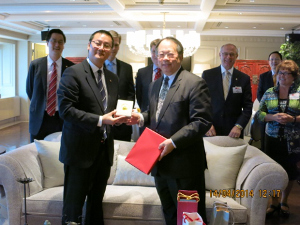
Former MP Chungsen Leung says he filed the required reports with the Office of the Conflict of Interest and Ethics Commissioner when he took a free trip to Taiwan with three other MPs and a senator in 2014.
The commissioner’s office says Leung didn’t report his trip, so it didn’t show up on the annual list of sponsored travel.
And Duff Conacher, co-founder of accountability advocacy group Democracy Watch, says the dispute shows the big gaps in the federal government’s approach to dealing with attempts by special interests to influence senators and MPs. The system promises transparency and full disclosure, but doesn’t deliver, he says.
“This situation shows how easy it is to use money and gifts to influence politicians in secret, and that is a very dangerous threat to Canada’s democracy,” Conacher said, referring to an overall “weak” oversight regime in Canada.
In July, The Tyee reported a Taiwan business association that was the biggest sponsor of travel for Canadian MPs has a number of board members with serious legal problems.
The organization, the Chinese International Economic Cooperation Association, has sponsored trips to Taiwan for members of all federal political parties, British Columbia Liberal and NDP MLAs and municipal politicians from across Canada.
Leung, the former Conservative MP for Willowdale in Ontario, went on a trip sponsored by the association with his spouse in April 2014. He appears in a photo on the association’s website.
But Leung’s Taiwan trip did not appear on the annual list of declared sponsored travel released by the Office of the Conflict of Interest and Ethics Commissioner.
Leung, who lost his seat in the 2015 election, said he filed the required reports with the ethics commissioner. “I did participate on a trip in 2014,” Leung said in an email. “The report was filed.”
But Margot Booth, communications manager for conflict and ethics commissioner Mary Dawson, said there is nothing in the office to suggest the trips were reported.
“If a sponsored trip does not appear in the List of Sponsored Travel, this would be because it was not reported to our Office,” Booth said in an emailed statement.
Leung’s trip wasn’t a secret. Other MPs, including Bev Shipley, Russ Hiebert and John Williamson, and Sen. Michael L. MacDonald were on the same trip and seen in photos.
The case might seem minor, Conacher said, but it says a lot about Canada’s loose procedures for disclosing travel paid for by special interests seeking to influence parliamentarians.
No matter who is at fault, Conacher said, the fact that Leung’s trip fell through the cracks so easily raises the concern that other sponsored trips have gone unreported.
Disclosures are regulated by the Conflict of Interest Code for Members of the House of Commons.
But Conacher said the code has no teeth and Canadians face stiffer penalties for parking illegally than MPs do for breaking the conflict code.
“If there’s a ruling against you, there’s a report in Parliament that’s public that you have violated the code, but there is no financial penalty,” he said. “Anyone who really takes this seriously thinks there has to be significant financial penalties to discourage violation.”
Conacher also slammed ethics commissioner Dawson for being too soft on MPs and having a “weak” enforcement record.
He pointed to Dawson’s previous rulings, such as one admonishing the Conservative party for putting its logo on ceremonial government cheques, but not finding the party in violation of the Conflict of Interest Act.
It should really be called “the almost impossible to be in a conflict of interest act,” said Conacher, who claimed it provides too many loopholes for MPs.
For example, he said, Members of Parliament aren’t allowed to accept gifts worth $100, but can accept junkets, such as Leung’s trip to Taiwan, that are worth thousands.
Conacher said government watchdog offices like the conflict commissioner don’t do enough to investigate possible violations, leaving the work to the media and political parties.
Dawson denied a request for an interview to answer questions about the concerns raised by Conacher. ![]()
Read more: Politics














Tyee Commenting Guidelines
Comments that violate guidelines risk being deleted, and violations may result in a temporary or permanent user ban. Maintain the spirit of good conversation to stay in the discussion.
*Please note The Tyee is not a forum for spreading misinformation about COVID-19, denying its existence or minimizing its risk to public health.
Do:
Do not: